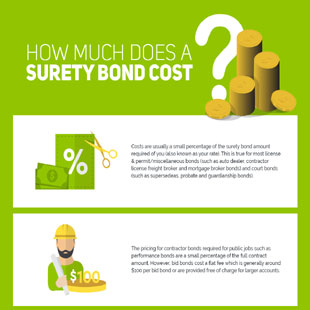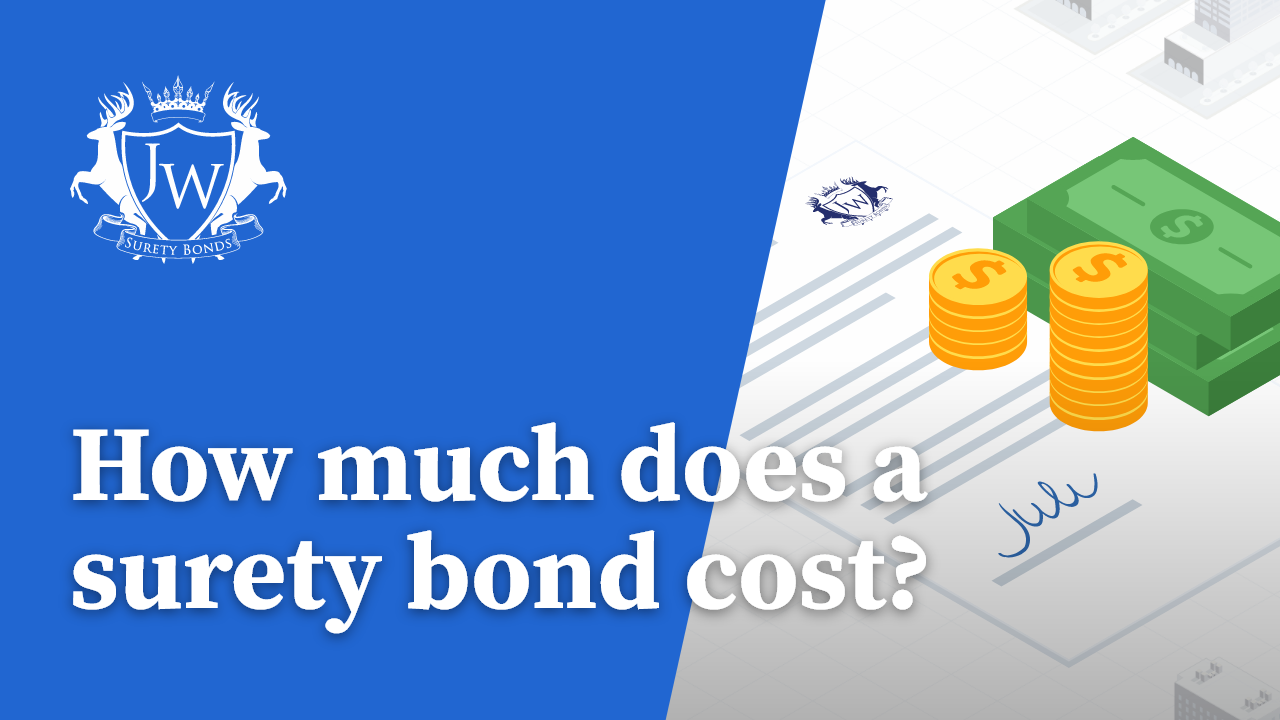How Much Does a Surety Bond Cost?
Surety bond costs are typically 1-10% of the bond amount, but this varies by the bond type required of you and your financial strength.
Generally speaking, the cost of a surety bond is calculated as a small percentage of the total bond amount that is required to be in place. Contractor bonds specific to public jobs, though, are based on the full contract amount.
Surety bonds are an essential part of doing business for many professionals and companies across a variety of industries.
However, the cost of a surety bond is different for each, depending on a handful of factors.
This guide lays out the factors that determine surety bond costs and will provide an example of a bond premium based on these pricing factors.
Ready to Get Started?
Get a real-time quote today.
Surety Bond Cost Breakdown
Surety bond costs are provided as dollars per thousand, represented by the dollar amount with a capital M. The premium formula is as follows: you bond amount x your rate / 1000. You can also look at the rate as a percentage of the bond amount you must pay. For instance, a 1% rate ($10 / M) on a $10,000 bond would cost you $100. The table below shows example calculations based on these factors.
| $10 / M | $15 / M | $30 / M | $50 / M | $75 / M | |
|---|---|---|---|---|---|
| $5,000 Surety Bond | $100* | $100* | $150 | $250 | $375 |
| $10,000 Surety Bond | $100 | $150 | $300 | $500 | $750 |
| $12,500 Surety Bond | $125 | $188 | $375 | $625 | $938 |
| $25,000 Surety Bond | $250 | $375 | $750 | $1,250 | $1,875 |
| $30,000 Surety Bond | $300 | $450 | $900 | $1,500 | $2,250 |
| $35,000 Surety Bond | $350 | $525 | $1,050 | $1,750 | $2,625 |
| $50,000 Surety Bond | $500 | $750 | $1,125 | $2,250 | $3,750 |
| $75,000 Surety Bond | $750 | $1,125 | $2,250 | $3,750 | $5,625 |
| $100,000 Surety Bond | $1,000 | $1,500 | $3,000 | $5,000 | $7,500 |
| $1,000,000 Surety Bond | $10,000 | $15,000 | $30,000 | $50,000 | $75,000 |
* A $100.00 minimum premium is generally required by sureties.
"Surety Bond Cost" Quick Video Overview
Don’t have time to read through our guide on surety bond costs? Check out this quick 90-second video below to get a better understanding of how bond costs are determined.
Sample Surety Bond Cost Calculation
Let’s say you need a $25,000 surety bond for your business, and the rate provided based on your credit history, business financial statements, and experience in the industry is $15 per thousand. This means the cost of your surety bond is $375, or 1.5% of the bond amount needed.
If you have less than ideal credit or minimal experience in your industry, your rate may be higher. For the same $25,000 bond with a rate of $50/M, the cost of your bond is $1,250. This is equal to 5% of the total bond amount.
Surety Bond Cost Calculator
If you want to quickly determine your surety bond costs, you can use our free surety bond cost calculator to get an instant ballpark estimate. Simply select the bond type you need, the bond amount and you will receive your instant price estimate. You can also take a look at our most frequently asked surety bond questions.
Surety Bond Rates Explained
Your rate is the percentage of the full bond amount you need to pay, and a direct reflection of how risky you appear to the surety companies.
Rates will vary depending on your likelihood of causing claims by failing to follow through with what your bond guarantees. Keep in mind, if you cause bond claims the surety company will pay them at first.
However, when a surety company writes a bond they are vouching for you by saying if you trigger bond claims, you'll pay them back in full (which can be as large as the full bond amount).
How is Your Risk Determined?
Surety companies will determine your risk for causing bond claims by looking at how you handle your financial responsibilities, which is usually done by reviewing your personal credit. When it comes to larger bonds, surety companies will look deeper by reviewing your personal credit, business credit, personal/business financial statements, your industry experience and anything else the underwriter can get their hands on to give them an idea of your likelihood to cause claims.
In today's digital world, underwriters will also use search engines and social media to see what they can gather on you. Your risk can also be boosted by what your bond guarantees, as some bonds are considered riskier than others due to the large number of claims that occur.
Surety Bond Costs by Bond Type
Several different types of surety bonds exist, and each requires a surety agency to look at your personal credit, financial statements and assets, and your experience in the business. However, the type of bond you need also plays a role in the rate you pay for your bond. Here are several common types of bonds and some insight into how much they cost.
How Much Does a License Surety Bond Cost?
The cost of your license bond is based on the bond amount required by your city or state, the type of specific license you are seeking, and the other factors mentioned above. Typically, this bond cost is between 1% to 10% of the total bond amount required for your license.
How Much Do Construction Bonds Cost?
The cost of a construction bond varies greatly depending on the specific type of bond you need. In most cases, however, the amount you pay is the same percentage range as other bonds, between 1% and 3% of the bond amount.
You can read our in-depth guide to determine what a performance bond cost for those in the construction industry. Also, we have put together information specific to bid bond costs as well.
"Contract Bond Costs for Projects" Quick Video Overview
If you want to learn how contract bond costs for projects are determined but don’t have time to read through each guide, you can watch our quick 90-second video below.
What Does a Fidelity Bond Cost?
The total cost you pay for fidelity bonds is based on the type of coverage you need, the amount of the bond, the number of employees you have, and certain controls you have in place for your business.
If you want to get a firm quote on your fidelity bond cost, you will need to fill out an application. You can also read our guide on how to get bonded and insured to get a better understanding of the costs associated with fidelity bonds and other surety bonds you may need.
How Much Does a Court Bond Cost?
All court bonds cost a percentage of the total bond amount, but the percentage you pay varies depending on the type of court bond you need.
- Probate bond costs are based mostly on personal credit, but pricing can also be impacted by other circumstances, like the complexity of the estate.
- Appeal bond costs are calculated using your business financial strength.
- Guardianship bond costs are dependent on personal credit as well as the character of the applicant.
Which Bond Do You Need?
The type of bond you need can vary based on the industry in which you work or operate a business, or may be based on state/federal guidelines. If you’re unsure of which bond type you need, you can use our "Find Your Bond" tool.
What Factors Drive Surety Bond Cost?
The percentage of the total bond amount you pay is based on a handful of factors, including your credit score, the type of bond you need, your financial statements, verification of assets, and your experience in the industry. Let’s take a closer look at each.
Credit Score: Standard Market vs. Bad Credit
Your personal credit history is a significant factor in how much you pay for your surety bond. Surety agencies take on a risk when they provide a new bond to a business professional. Even though you only pay for a percentage of the total bond amount, you are responsible for paying claims against your bond, up to the full bond amount. The surety agency pays for the claim initially, but you are promising to pay back any claims that are found to be legitimate. For this reason, surety agencies want to know you have a strong financial track record and a history of paying other bills and debts on time.
If you have good credit, meaning minimal or no negative marks on your credit report and a relatively high credit score, you are considered a standard risk to a surety agency. The price of your bond is calculated at a lower rate, so the percentage you pay is lower.
When you have less than ideal credit, you are a higher risk to a surety agency. You may have had missed payments in the past, bankruptcy, foreclosure, court judgments or liens, or accounts in collections that brought your credit score down and tarnished your credit report. With bad credit, the percentage of the total bond amount you pay will be higher because of this increased risk.
Type of Bond
In addition to your credit history, the type of bond you need will dictate how much you pay. Some obligees require higher bond amounts in certain industries to begin with. Freight brokers, for instance, are required to have a bond of at least $75,000 in place. Other bonds required by the Federal Government may also have higher bond requirements.
The higher the bond amount, the higher the cost to you since bond costs are calculated on the bond amount. Some examples of surety bond amounts and costs are provided below.
Financial Statements
Depending on your industry, financial statements may also be evaluated when you apply for a bond. A surety agency may ask for both personal and business financial statements, including bank statements, balance sheet, income statement, and tax returns. These documents are requested so that the surety agency can make a decision on your bond rate. If you have weak financial statements or an unable to provide them, you are assumed to be a higher risk and therefore, pay a higher percentage of the bond total.
Asset Verification
Surety agencies reviewing a bond application may also take into consideration assets you have on hand. Assets could include business or personal accounts or other items of value. Verifying the assets you or the business own is helpful in determining the risk you present as a bondholder. If you have no assets, and a negative credit history, you are likely to pay more for your surety bond that those who can verify their assets.
Experience in the Industry
Finally, the rate you pay for your bond is dependent on your experience in the industry for which the bond is needed. Having more experience means that you likely have the skills and knowledge necessary to avoid claims against your bond. Also, those who have been working in the same industry for several years who have few or no bond claims are a much lower risk to surety agencies than those who are just getting started.
Three Things You Should Consider Besides "How Much Do Surety Bonds Cost?"
Some bond agencies don’t take the time to explain that your surety bond premium is only one of several important things to consider when purchasing the bond you need. There are other factors you should be aware of when it comes to surety bonds and your business.
#1: Claims Put Your Personal Assets at Risk
As we have mentioned, you are responsible for paying any claims against your bond, and your personal and business assets will be used to pay claims back. Most bond agents fail to explain how claims can put you at risk and, most importantly, how you can avoid them. If you do not get this information from your agent or agency, it should be a red flag. Reconsider doing business with them.
Surety Bond Cost Infographic Guide

If a bond claim occurs, it is valuable to have a knowledgeable agent on your side. Instead of viewing you as a number as the large bond providers do, your surety agency sees you as the individual or business owner you are. When bond claims take place, a good bond agent will find a resolution in your best interest.
Because you pledge your assets when you purchase a bond, it is necessary to work with your bond agent as your first line of defense against bond claims. Having a claim is common – that’s why surety bonds exist in the first place. However, a bond agent will help determine if a claim is legitimate and the next best steps for you and your business. This helps protect your assets and your business. You can read about how our surety agency can save you money on bond claims here.
#2: Partner With a Strong Surety Company
Make sure you get your surety bond from a surety company that is financially strong and meets all of the requirements of the obligee. If you get your bond from a surety company that fails to meet common requirements, such as having the necessary financial strength rating from companies like A.M. Best, or being licensed to write bonds in your state, your bond will likely be rejected. You’ll have to purchase a new bond, and you won’t get a refund from the one you already paid for.
When working with a bond agency, be sure to ask if the surety company writing your bond meets the obligee’s requirements. Our surety agency only works with financially sound bonding companies , and we have direct access to them. If you want to learn more about finding the right bond company, read our informative post here.
#3: Turnaround Time on Your Surety Bond
Depending on who you work with, getting your surety bond can be a long and painstaking process. It may require you to submit dozens of pages of financial and business information which takes time. However, there are companies that streamline the bonding process by allowing you to apply and pay for your bond online. This reduces the amount of time you have to wait for your bond to be approved and in place.
How to Save on Surety Bonds
If you’re concerned about the potential cost of your bond, there are ways to reduce the rate you pay. Here are a few steps you can take now to ensure your bond is as affordable as possible.
Improve Your Working Capital
In business, working capital is the amount of your current assets minus your current liabilities. This calculation is provided to your surety agency as part of the application process for some bonds. It provides insight into the liquidity of your business and your ability to pay your bills. If you have strong working capital, you are likely to pay less for your bond.
You can improve your working capital by turning short-term debts into long-term liabilities. This may mean taking out a business loan that has a longer repayment period than your current debts, effectively lowering your monthly payment. You can also work to pay off short-term liabilities sooner rather than later to improve working capital. Either strategy will help lower the cost of your bond.
Fix Your Credit Score
Because personal credit plays such a vital role in the pricing of your surety bond, taking steps to improve it will help. Start by taking a look at your credit reports from the three credit bureaus – Equifax, Experian, and TransUnion. In your credit report, you can clearly see what may be bringing your credit down, such as late payments, collections, or even errors. You can dispute inaccurate information to help improve your credit score quickly, but you will also want to work on building good credit habits.
Showing that you are financially responsible will go a long way in getting an affordable price on your surety bond. This means making on-time payments to your debts, minimizing accounts in collections, avoiding negative marks like bankruptcy or foreclosure, and limiting how much you use available credit lines. Following these steps will help boost your credit score over time, which will ultimately lead to a lower cost for your bond.
Optimize the Liquidity of Your Assets
Similar to improving working capital, increasing the liquidity of your assets can help lower your bond cost. Surety agencies want to see that you have enough money to cover your financial responsibilities, and having liquid assets is beneficial. To improve your liquidity, consider selling assets you no longer need for cash. You can also speed up your invoice process and encourage customers and clients to pay quickly. Reducing overhead expenses is also beneficial in optimizing the liquidity of your assets.
Choose a Reliable Surety Agency
Not all surety agencies are created equal, and not all will provide the same pricing for your bond. It is important to select your surety company carefully if you want to be sure you are paying the right price. Do some research on how much experience the agency has, if they have a good reputation, and the underwriting process for new bonds. You will also want to ensure your surety agency understands your specific industry, and that it works with several different bonding companies. A surety agency with these qualities will help you get access to the most affordable bond for your circumstances.
Get Your US Citizenship
Most surety agencies view non-U.S. citizens as a higher risk because they may not have physical ties to the country. This means they may not have a reason to keep paying on bond claims if they take place. Consider getting citizenship as this will help lower your risk, and therefore, the cost of the bond you need.
The Consumer’s Guide to Surety Bonds E-Book
If you want the most thorough answers available to all of the fundamental questions related to getting a surety bond (such as "what do surety bonds cost?"), you can download our free "Consumer's Guide to Surety Bonds" e-book. The topics covered in the e-book include:
- How surety bonds work
- Surety bond pricing
- How indemnity agreements affect you
- The various surety bond types required
- How to get bonded
- How claims affect you
This e-book was created with first time applicants in mind, and is an excellent resource if you're unfamiliar with how surety bonds work, pricing and how they can greatly affect you or your business.



